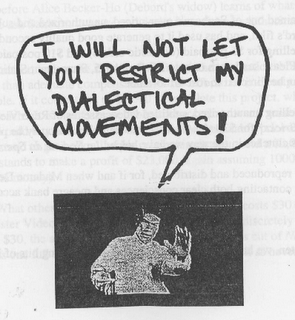Subcultures are defined not so much by their particular kind of commodities, music, clothes, etc., but by a particular relation to commodities. This relation runs the gambit from a strong sense of identification, which is usually exclusive (the rest of the world does not appreciate the genus of “blank”), to ironic detachment, “so bad its good.” Often it is the particular relation, and not the aesthetic values of the commodities concerned, that takes precedence. Case in point, the concern about “selling out” in circles of punk, indie rock, etc.: what is lost when the band moves to a major label is not so much its particular sound, but that feeling of exclusive identification. The band is no longer your band when all of he kids at the mall are wearing their shirt.
These are the thoughts that crossed my mind last night when I was watching The White Stripes perform. At one point I really liked The White Stripes, but then all of the exposure, the guess stints on The Simpsons and Cold Mountain, not to mention the fact that the records after “White Blood Cells” that lacked the geeky intensity of the early recordings, made it difficult to sustain the same level of enthusiasm. When the show began I was firmly entrenched in the existential position of jaded indie-rocker. The first thing I noticed was all of the kids wearing brand-spanking new White Stripes t-shirts; I thought to myself, have the rules of cool changed that much? You do not wear a new shirt of the band you are seeing, an old shirt from their first tour, maybe. Better yet, a shirt from another band somehow related, but more obscure than the band that you are seeing, in this case The Detroit Cobras or The Black Keyes. Then, I a said to my friend Ron, “It makes you wonder what were all of these kids with new shirts wearing to the show?” To which he replied, “Maybe there is a dumpster full of Killer’s t-shirts out back.” Yeah it went like that, at least at the beginning.
As Jack and Meg entered the stage to the sounds of “Boogie Chillin’,” I thought to myself, I wonder how many people here even know who John Lee Hooker is, let alone catch the reference to the Detroit blues sound, which is so important to the White Stripes? My bitter mocking may have something to do with the fact that, when I was in High School, I went to see John Lee Hooker play and the only person I could get to go with me was my father, my peers did not care. So perhaps I was just jealous of the fact that those cool points came nearly twenty years too late. Then something happened as The White Stripes played, I forgot all about kids with new shirts, the widely out of place mosh pit up front, and sad attempts as Mohawks, I just heard the music. I am not claiming an unmediated experience here, all I am saying is that they rocked. Sometimes it is good to remember that it can be about the music.
These are the thoughts that crossed my mind last night when I was watching The White Stripes perform. At one point I really liked The White Stripes, but then all of the exposure, the guess stints on The Simpsons and Cold Mountain, not to mention the fact that the records after “White Blood Cells” that lacked the geeky intensity of the early recordings, made it difficult to sustain the same level of enthusiasm. When the show began I was firmly entrenched in the existential position of jaded indie-rocker. The first thing I noticed was all of the kids wearing brand-spanking new White Stripes t-shirts; I thought to myself, have the rules of cool changed that much? You do not wear a new shirt of the band you are seeing, an old shirt from their first tour, maybe. Better yet, a shirt from another band somehow related, but more obscure than the band that you are seeing, in this case The Detroit Cobras or The Black Keyes. Then, I a said to my friend Ron, “It makes you wonder what were all of these kids with new shirts wearing to the show?” To which he replied, “Maybe there is a dumpster full of Killer’s t-shirts out back.” Yeah it went like that, at least at the beginning.
As Jack and Meg entered the stage to the sounds of “Boogie Chillin’,” I thought to myself, I wonder how many people here even know who John Lee Hooker is, let alone catch the reference to the Detroit blues sound, which is so important to the White Stripes? My bitter mocking may have something to do with the fact that, when I was in High School, I went to see John Lee Hooker play and the only person I could get to go with me was my father, my peers did not care. So perhaps I was just jealous of the fact that those cool points came nearly twenty years too late. Then something happened as The White Stripes played, I forgot all about kids with new shirts, the widely out of place mosh pit up front, and sad attempts as Mohawks, I just heard the music. I am not claiming an unmediated experience here, all I am saying is that they rocked. Sometimes it is good to remember that it can be about the music.


